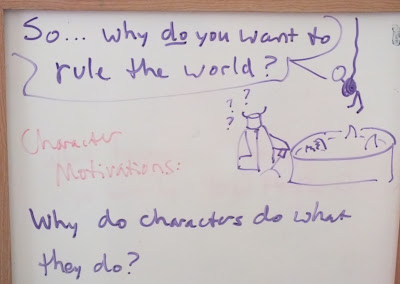Wednesday, March 27, 2013
So... why DO you want to rule the world?
Of course we all know the answer to this one. Characters do stuff because the writer makes them. But we don't want the audience to know that. No, we have to preserve the illusion that the characters are doing things because they want to. Because they have to. Because they're driven by their inmost desires, their deepest hopes, their darkest fears.
How do you do that?
Number one, you have to understand your character's motivations. Think about it for a while. Dig deep. One of our club members gave an example from one of her stories of a young apprentice wizard whose master is accused of betraying the other wizards in his order. The apprentice thinks her master must be innocent and wants to go rescue him. This is a fantastic premise for a story, but what would make it even better is a really good reason behind the apprentice's noble actions. WHY is the apprentice so sure that her master is innocent? Why does the apprentice risk everything, including being accused of being a traitor herself, to go and save this guy?
Once the writer knows the answer to this kind of question, the writer knows more about the character. Not only the motivations, but about important pieces of the character's life history and personality. Delving deep into character motivations makes for richer characters.
A few more hints. Don't go with obvious motivations. Brainstorm. Come up with several ideas and pick your favorite. If you can, plant motivations in your characters that work against each other. That way you can keep the reader guessing as to what your character will do next.
To learn more about motivations it might help to read some books on behavior and psychology. Sources of motivation include basic human needs like love and acceptance, survival, a sense of control, sleep (this is a serious motivator for me), and purpose in life. Other motivations come from life experience. What has rewarded or punished your character in the past? Build up more specific motivations out of these basic ones. Does your character have an irrepressible drive to acquire money? Why? Does it give her a sense of control? Does she do it to gain acceptance from wealthy friends? Has it become her purpose in life? Maybe some of each. The motivations behind the motivation will affect her choices and reactions throughout the story.
A word of warning. Even though you don't have to explain every motivation for every character in your story, readers can tell when a character is being motivated by plot expediency or writer whim, and they will immediately cease to believe in that character. Keep it real. Motivate your characters.
Subscribe to:
Post Comments (Atom)

No comments:
Post a Comment